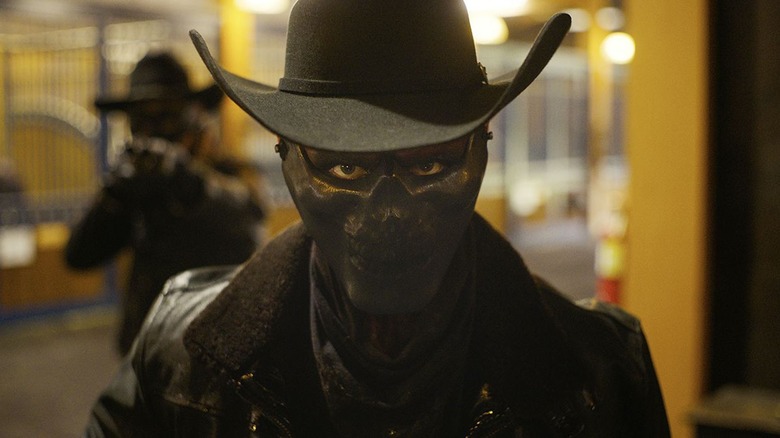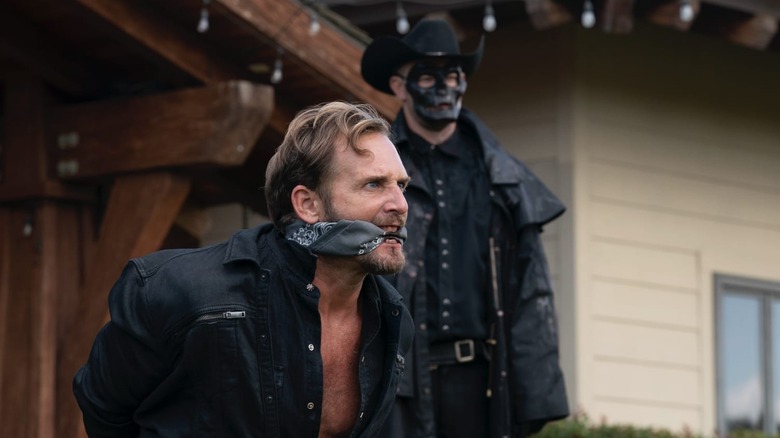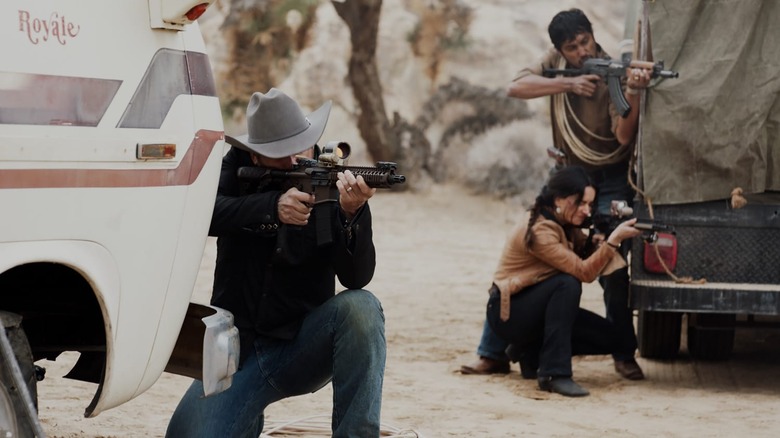The Forever Purge Review: Going Out Sad
In four feature films and one whole television series spinoff, the "Purge" franchise repeatedly showed potential it will now never get to fully deliver upon. The fifth and final film in the series, "The Forever Purge," ends the franchise on the big screen not with a bang but a whimper, a last gasp of surface-level agitprop masquerading as genuine intrigue. Franchise mastermind James DeMonaco returns here as writer and producer, with Everardo Gout handling directing duties; one can't help but wonder how much longer these films' legs could have been with more fresh meat behind the scenes.
This is a series that started out with a high-concept, claustrophobic home invasion thriller ("The Purge"), evolving into a pair of more irreverent exploitation flicks ("The Purge: Anarchy" & "The Purge: Election Year") before tearing the training wheels off, riding hard and fast into the film's political subtext with "The First Purge," a film that struck a finer balance between edgy horror posturing and genuine social commentary. But this latest entry feels shallow, insipid, and most offensive of all, supremely boring.
Take away the "Purge" branding and some of the touchstones to the established mythology and this would be the kind of silly modern political allegory that wouldn't crack the top 20 of any VOD sales chart. It's a pen-scrawled-on-napkin length idea for the logical endpoint of the "Purge" concept stretched as thin as it'll go, with so few redeeming qualities the viewer must choose between holding out hope Blumhouse gives this one more attempt to provide a more fitting final act and letting out a considerable sigh of relief that the series has been put out of its misery.
Rules are meant to be broken
"The Forever Purge" picks up from the end of "The Purge: Election Year" when Senator Charlie Roan (Elizabeth Mitchell) won the Presidency on an anti-Purge campaign, outlawing the annual day allowing crime. As that film closed, Purge enthusiasts and NFFA (New Founding Fathers of America) loyalists took to the streets, wreaking havoc and refusing to accept the election results, or the policy changes that came with them. Though none of the characters from that film continue into this entry, that plot strand does. The NFFA have regained power, with their first order of business re-instituting the Purge.
The opening credits montage paints a country divided in half, torn asunder by disinformation in the media and the rise of white nationalism, a thread further tugged by the introduction of this chapter's core cast. Our protagonists are split between two families. On one side, Mexican immigrants Adela (Ana de la Reguera) and her husband Juan (Tenoch Huerta); on the other, the white family Juan works for, led by the openly bigoted Dylan (Josh Lucas) and his pregnant wife Emma (Cassidy Freeman). Dylan's father Caleb (Will Patton) is accepting in that Bradley Whitford in "Get Out" liberal sort of way, but Dylan doesn't hate Mexicans or think whites are inherently better. Just that they should each keep to their own. Because that's better, somehow.
There's some professional animosity on the ranch between Dylan and Juan over Juan's superior horse whispering skills, presented in a scene that feels like a Chloe Zhao movie for dummies, encapsulating the encroaching fear of the white man losing his vaunted place in society over a brown man being better at cowboy duties. The stage is all set for this feud and other simmering conflicts presented in the opening scenes to erupt on Purge Night. But the film's solitary trick revealed in the trailers and the portentous title means all the important characters survive the Purge, only to wake up to a world where the night never ends.
A slew of extremists across the country decide the Purge will just continue indefinitely, using it as cover for a variety of aims, but primarily the ethnic cleansing of America at the hands of white folks who consider themselves the nation's rightful owners.
In a move that DeMonaco and the filmmakers surely find profound but proves dull and vaguely ironic, both Canada and Mexico open their borders to Americans wishing to flee the abject chaos their country becomes, with only a few hours of random, violent Purging devolving into absolute anarchy. There's supposed to be some bitter turn of events where the NFFA has to reckon with their convenient creation, a sycophantic mob who will believe anything, turn on their masters, but any of that cruel catharsis has to happen in the mind of the viewer, because the film itself has much tamer and more muddled political ideas to wrestle with instead.
Art imitating life, imitating art
This is really the best they could do? Ever since "The Purge" came out in 2013, fans have clamored for a more enticing exploration of this firecracker of a film concept. It's an idea that can provide such fertile ground for ideas, but outside of the television series, which has a little more room to stretch within the franchise's paradigm, the movies always seem to imply that the next film will be the one to really expand the landscape. But instead, it's just the same blandly shot action, uninventive carnage, and lazy aesthetic of sociopaths in Halloween masks.
"The Forever Purge" lacks any of the texture or charm of "Election Year," but that stylistic failure could be forgiven if they could at least double down on the commentary of "The First Purge." Instead, the film becomes the most rote, centrist "voice of reason" movie in the entire series. This is a film where we're expected to applaud Dylan and Juan working together against the "bad guys" without ever truly forcing Dylan to reckon with his bigotry. It's a movie that wastes Will Patton, one of our best character actors, on a melodramatic speech about how the working class Purgers they meet turning the tables on their affluent oppressors are just as bad the white nationalists using the Purge as cover for literal genocide. There's even a ham-fisted moment when Dylan tells a Native American protestor that he doesn't have to pick up arms to help them flee to Mexico because it's not his fight, just so that same man can posit that he's been fighting this fight for 500 years.
Perhaps it shouldn't be a surprise that, as President Joe Biden continues to harp about healing the soul of America, a franchise as violent and exploitative as "The Purge" would need to be defanged and declawed so people who own Nancy Pelosi candles and "Coexist" bumper stickers can feel a bit of onscreen representation in a series that started out with Ethan Hawke hiding in his house from murderers dressed like Jhonen Vasquez drawings.
It's also not a surprise that "The First Purge," the most politically aggressive in the series, was the first to not improve upon the prior release's box office returns domestically. Sure, it's the highest-grossing "Purge" film globally, but stateside it was a step behind "Election Year," a movie that was released July 4th weekend in 2016, right before its daring and dystopian worldview would go from being a clever horror setup to a literal documentary. In 2021, entirely too many of this series' key plot machinations sound less fantastical and more like pale shades of real world events, draining it of its considerable "what if" appeal and revealing it to be little more than a thin simulacrum of the actual dystopia we're still living in.
It's the "Black Mirror" problem. The more our society advances into madness, the more popular media designed to comment on it feels like a joke. Maybe a few years ago, a scene of a guy with a swastika face tattoo screaming in the back of a van about how crime no longer exists could be a thrilling piece of window dressing in a post-apocalyptic movie. Today, it just seems quaint. "The Forever Purge" sells itself on a proposition that makes settling for that level of letdown too high an ask for an audience just dipping their toe back into theatrical exhibition. They deserve a better movie. This series deserves a better coda.


